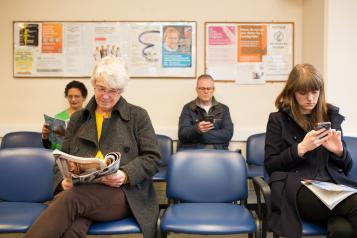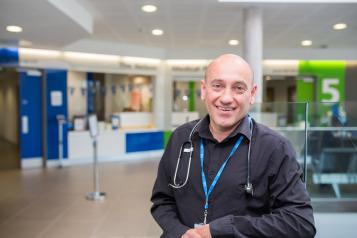Information about the COVID-19 vaccine

The NHS has advised that the COVID-19 vaccine is safe and effective.
It gives you the best protection against COVID-19.
This page was last updated: 27th April 2022
Can I get the vaccine?
First and second doses of the COVID-19 vaccine are available for:
- people aged 5 and over
Boosters are available for:
- people aged 16 and over
- at risk children aged 12 to 15 years old
Spring boosters are available for:
- people aged 75 and over
- peopled aged 12 and over with a weakened immune system
Additional primary doses are available for:
- peopled aged 12 and over with a severely weakened immune system
For more information, or to book your vaccination, visit the NHS website.
How do I get the COVID-19 vaccine?
If you are eligible to get the COVID-19 vaccine, you can book an appointment online.
How is the COVID-19 vaccination given?
The COVID-19 vaccination is given as an injection into your upper arm.
How safe is the COVID-19 vaccine?
The NHS advises that:
"The vaccines approved for use in the UK have met strict standards of safety, quality and effectiveness set out by the independent Medicines and Healthcare products Regulatory Agency (MHRA).
Any coronavirus vaccine that is approved must go through all the clinical trials and safety checks all other licensed medicines go through. The MHRA follows international standards of safety.
Other vaccines are being developed. They will only be available on the NHS once they have been thoroughly tested to make sure they are safe and effective.
So far, millions of people have been given a COVID-19 vaccine and reports of serious side effects, such as allergic reactions or clotting problems, have been very rare."
For more information on vaccine safety, please visit the NHS COVID-19 vaccination website.
What are the side effects of the COVID-19 vaccine?
Most side effects are mild and should not last longer than a week. These include:
- A sore arm where the needle went in
- Feeling tired
- A headache
- Feeling achy
- Feeling or being sick
If your symptoms get worse or you are worried, call 111.
You can report side effects to the COVID-19 vaccine to the Government’s Medicines and Healthcare products Regulatory Agency (MHRA). You can do this on the MHRA Yellow Card website.
Reports of extremely rare blood clots
There have been reports of an extremely rare blood clotting problem affecting a small number of people who have received the Oxford/Astra Zeneca vaccine.
For people aged 40 or over and those with other health conditions, the benefits of being vaccinated outweigh any risk of clotting problems. For people under 40 without other health conditions, it's currently advised that it's preferable to have another COVID-19 vaccine instead of the Oxford/AstraZeneca vaccine.
Call 111 immediately if you get any of these symptoms starting from around 4 days to 4 weeks after being vaccinated:
- a severe headache that is not relieved with painkillers or is getting worse
- a headache that feels worse when you lie down or bend over
- a headache that's unusual for you and occurs with blurred vision, feeling or being sick, problems speaking, weakness, drowsiness or seizures (fits)
- a rash that looks like small bruises or bleeding under the skin
- shortness of breath, chest pain, leg swelling or persistent abdominal (tummy) pain
You can find out more about COVID-19 vaccination and blood clotting on the GOV.UK website.
Can I access guidance in another language?
You can find up-to-date, accurate COVID-19 guidance in other languages on the Doctors of the World webpage.
This guidance is in Afrikaans, Albanian, Amharic, Arabic, Armenian, Bengali, Bulgarian, Burmese, Czech, Dari, Dutch, English, Estonian, Farsi, Filipino, Finnish, French, German, Greek, Gujarati, Hausa, Hindi, Hungarian, Igbo, Indonesian, Italian, Kiswahili, Korean, Krio, Kurdish Sorani, Latvian, Lithuanian, Malayalam, Nepali, Oromo, Pahari, Pashto, Pidgin, Polish, Portuguese, Punjabi, Romanian, Romany, Russian, Simplified Chinese, Sindhi, Slovak, Somali, Spanish, Tamil, Tetum, Tigrinya, Traditional Chinese, Turkish, Twi, Urdu, Vietnamese, Wolof, Yiddish, Yoruba.
How can I identify COVID-19 vaccine scams?
Several COVID-19 vaccine scams have been reported in Enfield.
The COVID-19 vaccine is only available on the NHS for free. Anyone offering a paid-for vaccine is committing a crime.
The NHS will never ask you to press a button on your keypad or send a text to confirm you want the vaccine. The NHS will never ask for payment or for your bank details.
At the moment, the NHS is not making house calls to deliver or discuss the vaccine. Anyone offering this now is committing a crime.
The Government has produced a leaflet about COVID-19 vaccine scams, how they work, and how to spot them.
I need to travel abroad. How can I demonstrate my COVID-19 vaccine status?
Some countries require international travellers to have completed a full course (either two or three doses) of the COVID-19 vaccine. If you are travelling abroad, you may need to demonstrate your COVID-19 vaccine status.
COVID-19 vaccination status is available to people who live in Enfield and are registered with a GP. You can get your vaccination status in digital or paper format.
Your NHS appointment card from vaccination centres cannot be used to demonstrate your vaccine status.
You can access your COVID-19 vaccine status through the free NHS App, through the NHS Website, or by calling 119. Do not contact your GP surgery about your COVID-19 vaccination status. GPs cannot provide letters showing your COVID-19 vaccination status.
For more information on how to demonstrate your COVID-19 vaccine status, visit the GOV.UK website.
Easy Read information
You can download an Easy Read guide about the COVID-19 vaccine developed by Mencap.
Information about the Coronavirus vaccine in alternative languages
NHS England have produced some videos about the Coronavirus vaccine in the following languages:
- Arabic
- Bengali
- Gujarati
- Polish
- Punjabi
- Romanian
- Spanish
- Swahili
- Turkish
- Urdu
- Yoruba
You can watch the videos below and you can find out more information on the NHS England website.
There is a link to download each video listed below. Please download the videos and share with friends, family and community groups via WhatsApp, text message and/or social media.


